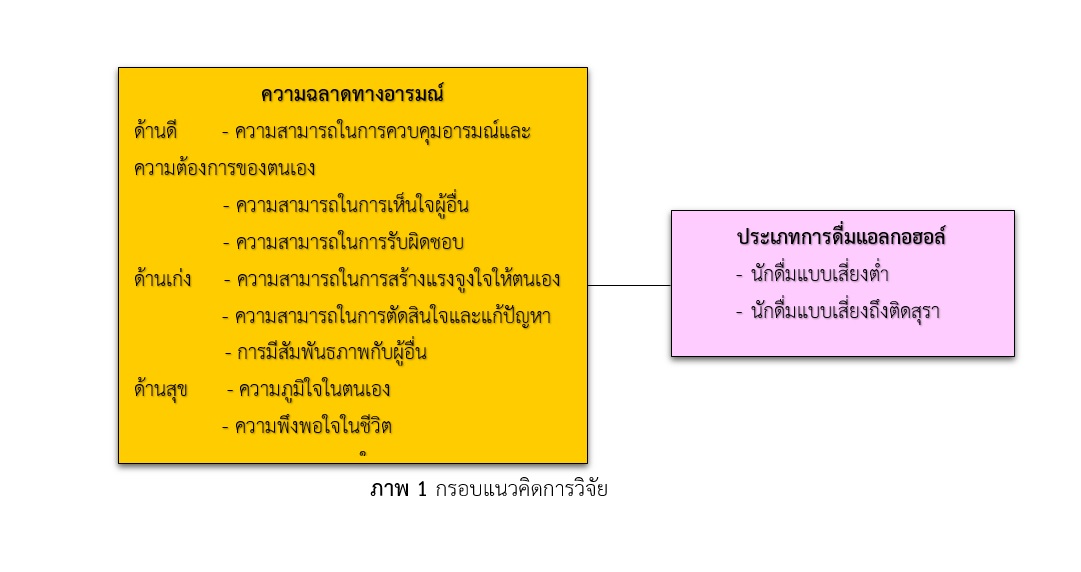ความสัมพันธ์ระหว่างความฉลาดทางอารมณ์และการดื่มเครื่องดื่มแอลกอฮอล์ ของวัยรุ่นในอำเภอเมือง จังหวัดลำปาง
คำสำคัญ:
วัยรุ่น, พฤติกรรมการดื่มแอลกอฮอล์, ความฉลาดทางอารมณ์บทคัดย่อ
การศึกษาวิจัยแบบบรรยายเชิงสหสัมพันธ์นี้ เพื่อหาความสัมพันธ์ระหว่างระดับของความฉลาดทางอารมณ์กับประเภทความเสี่ยงของการดื่มแอลกอฮอล์ของวัยรุ่นที่มีอายุระหว่าง 12-18 ปี ในเขตอำเภอเมือง จังหวัดลำปาง กลุ่มตัวอย่างจำนวน 444 คนได้โดยการสุ่มแบบหลายขั้นตอนจากสถาบันการศึกษาทั้งสายสามัญและสายอาชีพ เครื่องมือคือ 1) แบบสอบถามข้อมูลทั่วไปและลักษณะการดื่มแอลกอฮอล์ 2) แบบประเมินความฉลาดทางอารมณ์และ 3) แบบประเมินการติดสุราฉบับภาษาไทยของโรงพยาบาลสวนปรุง ค่าความเชื่อมั่นได้ค่าสัมประสิทธิ์อัลฟ่าของครอนบาค เท่ากับ 0.90 และ 0.89 ตามลำดับ การวิเคราะห์ข้อมูลใช้สถิติเชิงพรรณนาและการทดสอบไคร์สแควร์ ผลการวิจัยพบว่า
1. กลุ่มตัวอย่างมีความฉลาดทางอารมณ์ปกติตามเกณฑ์ ร้อยละ 52.2
2. กลุ่มตัวอย่างส่วนใหญ่เป็นผู้ที่ดื่มแอลกอฮอล์ร้อยละ 51.47 เพศชายร้อยละ50.90 อายุน้อยที่สุดที่เริ่มดื่มแอลกอฮอล์ คือ 12 ปี และอายุเฉลี่ยของนักดื่มครั้งแรกที่อายุ 14.7 ปี (SD=1.39) ส่วนใหญ่ดื่มเบียร์ร้อยละ51.47 และเป็นนักดื่มแบบเสี่ยงต่ำร้อยละ 86.26
3. ระดับความฉลาดทางอารมณ์ไม่มีความสัมพันธ์กับประเภทของการติดสุราอย่างมีนัยสำคัญทางสถิติ (χ2=3.44, p=.58) แต่เมื่อแยกวิเคราะห์แต่ละองค์ประกอบทั้ง 9 องค์ประกอบ พบว่า ความสามารถในการควบคุมอารมณ์และความต้องการของตนเองมีความสัมพันธ์กับการติดสุราอย่างมีนัยสำคัญทางสถิติ (χ2=5.57, p=.02)
ดังนั้น ควรพัฒนาความฉลาดทางอารมณ์รายด้านโดยเน้นเรื่องการควบคุมอารมณ์และความต้องการของ ตนเองเพื่อให้วัยรุ่นมีทักษะในการป้องกันการติดสุรา
เอกสารอ้างอิง
Bogg, T., Lasecki, L., & Vo, P., (2016). School Investment, Drinking Motives, and High-Risk, High-Reward Partying Decisions Mediate the Relationship Between Trait Self-Control and Alcohol Consumption among College Drinkers. Journal of Studies on Alcohol and Drugs, 77(1), 133-142. Abstract Retired May 5, 2020 from jsad.com
Department of Mental Health. (2003). Guideline for Emotional Quotient. Retired August 20, 2019 from www.dmh.go.th. (in Thai)
Department of Mental Health. (2020). Intelligent and Emotional Quotient Survey in Primary First Year Students in B.C. 2559. Retired April 26, 2019 from www.dmh.go.th. (in Thai)
Homsin, P., & Srisuriyawet, R., (2019). Life Assets and Risk Factors among Hearing Impaired Adolescents in Central and East Thailand. The Public Health Journal of Burapha University, 14(1), 93-105. (in Thai)
Laosabcharoen, S., Sangon, S., & Nintachan, P. (2013). A Synthesis of Research on Promoting Emotional Intelligence for Adolescents. Rama Nursing Journal, 9(1), 31-47. (in Thai)
Leeviroj, P., Pichai, P., Singhasem, P., & Rungchamrat. (2016). Acceptance and Development of Alcohol Policy. Journal of Thonburi University, 10(2), 28-39. (in Thai)
Lekfuangfu, N., Tharnpanich, N., Tacharoen, K., & Witvorapong, N. (2015). Status Report on Alcoholic Beverages in Northern Region B.E. 2558. Retired August 21, 2019 from www.thaihealth.or.th. (in Thai)
Lekfuangfu, N., Tharnpanich, N., Tacharoen, K., & Witvorapong, N. (2016). Facts about Alcohol: Status Report on Alcoholic Beverages in Thailand B.E. 2558. Retired August 21, 2019 from www.thaihealth.or.th. (in Thai)
National Statistical Office. (2019). Statistical Year Book Thailand B.E. 2558. Retired August 27, 2019 from www.nso.go.th. (in Thai)
Osgood, J., & Muraven, M., (2018). Self-Control and Alcohol Consumption. In D. de Ridder, M. Adriaanse, M., & K. Fujita (Ed.). Routledge International Handbook of Self-Control in Health and Well-Being. (pp. 251-263). New York, NY: Routledge/Taylor & Francis Group.
Ridder, D., Adriaanse, M., & Fujita, K. (2018). Self-Control in Health and Well-Being: Concepts, Theories, and Central Issues. In D. de Ridder, M. Adriaanse, & K. Fujita (Ed.). Routledge International Handbook of Self-Control in Health and Well-Being. (pp. 1-8). New York, NY: Routledge/Taylor & Francis Group.
Silpakit, P., & Kittirattanapaiboo, P. (2009). The Alcohol Use Disorders Identification Test: Guidelines for Use in Primary Care 2nd ed. Bangkok: Tartawan. (in Thai)
Songklang, S., & Yangyuen, S., (2020). Correlations Between Social Environment Factors and Alcohol Use among Adolescents. The Southern College Network Journal of Nursing and Public Health, 7(1), 32-44. (in Thai)
Suwanbamrung, C. (2016). Research Process: An Implementation for Health and Nursing. Nakhon Si Thammarat: Ko. Pornkarnpim. (in Thai)
Thaikla, K., & Aekplakorn, W. (2017). Health Behavior. In W. AekPlakorn (Ed). Report: Health Survey for Thai People by Physical Examination 5th B.E. 2557. Nonthaburi: Health Systems Research Institute. (in Thai)
Thammaraksa, P., & Powwattana, A., (2019). Emotional Intelligence and Risk Behaviors in Adolescents. Journal of Health and Nursing Research, 35(3), 212-223. (in Thai)
Treepatree, S., (2019). Development and Adaptation for Teenagers. Retired September 2, 2019 from nicfd.cf.mahidol.ac.th. (in Thai)
World Health Organization. (2018). Global Status Report on Alcohol and Health 2018. Retired August 27, 2019 from who.int/substance_abuse/publications/global_ alcohol_report/gsr_2018/en.

ดาวน์โหลด
เผยแพร่แล้ว
ฉบับ
ประเภทบทความ
สัญญาอนุญาต
1. บทความหรือข้อคิดเห็นใด ๆ ที่ปรากฏในวารสารเครือข่าย วิทยาลัยพยาบาลและการสาธารณสุขภาคใต้ ที่เป็นวรรณกรรมของผู้เขียน บรรณาธิการหรือเครือข่ายวิทยาลัยพยาบาลและวิทยาลัยการสาธารณสุขภาคใต้ ไม่จำเป็นต้องเห็นด้วย
2. บทความที่ได้รับการตีพิมพ์ถือเป็นลิขสิทธิ์ของ วารสารเครือข่ายวิทยาลัยพยาบาลและการสาธารณสุขภาคใต้







